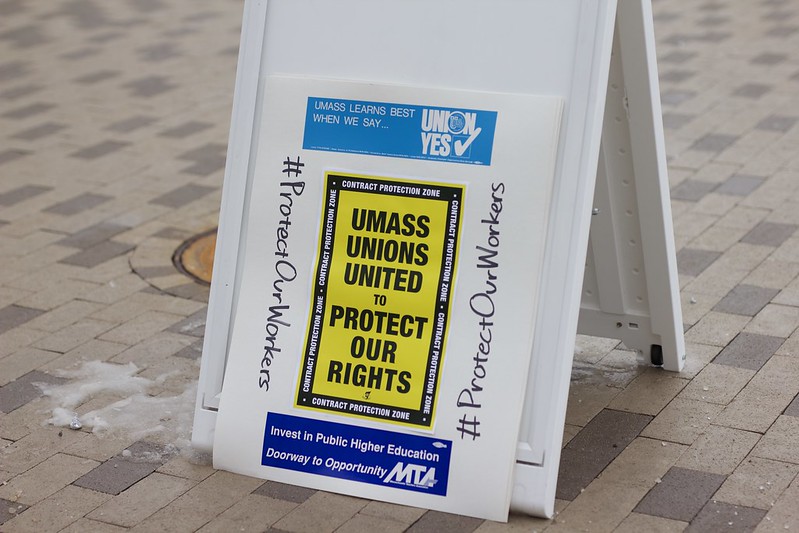On Wednesday at 11:50 a.m., a group of bundled protesters began passing out brown paper bags in front of the University of Massachusetts Student Union. Inside the bags were three things: a black surgical mask, a cloth mask with yellow lettering reading “UMass Unions United for a Healthy Workplace,” and a list of demands.
By 12 p.m., the protest had grown to approximately 100 people. One protester held a sign with bold lettering: “Keep Your Word!”
The protesters were calling on the University to meet a list of requests from the unions and to finalize new contracts. The protest was planned by the staff unions, the Graduate Employee Organization and the Massachusetts Society of Professors.
All of the unions’ contracts expired in July 2020, and since then, bargaining has been dragging on for over two years.
MSP reached a one-year extension agreement on their expired contract, but that ran out by the end of June of 2021. According to Leslie Marsland, president of the University Staff Association, there were no salary increases in the extension.
For the past two years, the unions have been stuck operating under the rules of their expired contracts, which were established in 2017.
Now, the unions are calling for change.
“We’re looking for our contracts to be funded fairly,” Marsland said. “Inflation has risen so much during this pandemic, so we’re looking for a decent cost of living raise.”
The Unions are also asking for hazard pay for the workers who had to stay on campus through the most dangerous months of the pandemic.
“They were risking their lives,” Marsland said. “They deserve something extra.”
Another priority for the unions is safer facilities to help curb the spread of viruses.
“The pandemic really showed us that we need healthier buildings with better ventilation, for students but also for faculty and staff,” said Asha Nadkarni, who is on MSP’s bargaining team.
Raises and new facilities are only part of the hopes that the Unions have for their next round of contracts. They also want to see UMass address issues of inequality on campus.
“We’re also fighting for closing the salary gap and racial and gender equity issues,” said Jackie Kurland, MSP’s vice president.
According to a statement from the University, “UMass Amherst continues to bargain in good faith with the unions representing our employees, and we are hopeful of reaching agreements with them in the near future.”
At around 12:10 p.m., the protesters marched towards the Campus Center. Mike Dufresne, the chapter chair of Unit B of the Professional Staff Union, took center stage, standing in front of the entrance to Blue Wall and addressing the crowd.
“PSU, Unit B are all frontline supervisors. We’re all deemed on-site, essential personnel, and we are not compensated for it,” said Dufresne, who was immediately met with cheers.
Dufresne was joined by Mya Pol, a UMass student and disability activist who spearheaded a movement to make UMass more accessible, called Access UMass.
“We need more support,” Pol said. “Access UMass is a recent student organization that is dedicated to advocating for equitable access on campus, which is not currently possible, especially under the current COVID protocols.” Pol went on to call for mandatory COVID-19 testing to better track the spread of the virus.
“When we don’t test individuals, we can’t effectively know who is positive with COVID, which is putting every single student, every single staff and faculty member and the surrounding community members of Amherst at risk,” Pol said.
All the staff unions have had some type of new agreements with the administration since the pandemic began, but nothing as all-encompassing as their three-year contracts. Since negotiations have dragged on for two years past the expiration of the last contract, the new contract will be short lived.
“A year from now, we’ll be negotiating the 2023-2026 contract,” said Eve Weinbaum, the co-president of MSP.
That doesn’t, however, make these contracts less important, according to Weinbaum, because “whatever we negotiate that’s economic will be retroactive ’till July 1, 2020.”
“That’s why there is a lot at stake because people have not gotten a raise in a long time, and the staff unions took furloughs, which was basically a pay cut,” Weinbaum said.
“We want more respect from the University in terms of how they treat us,” said Ian Rhodewalt, who is on the bargaining committee for GEO. “Sometimes they view us as disposable.”
Sophia Gardner can be reached at [email protected] and followed on Twitter @sophieegardnerr.





















Jennifer • Feb 17, 2022 at 8:56 pm
The way they treat faculty is truly shameful. The schools could function without the Assistant to the VP of Something Something. But try running a University without TEACHERS. It is disgusting how they treat the people who provide the actual education. Every year, faculty has to literally BEG for a measly raise that doesn’t even keep pace with cost of living. Then they are asked to take a pay cut when the school somehow doesn’t have the money, but finds the money to hire 10 new administrators. Waiting 3-4 years for a raise may not be a big deal to someone making 150k, but many faculty are in the 60-80k range and this burden is becoming TOO MUCH. ENOUGH ALREADY!!!!! Shame on you.
Ann • Apr 1, 2022 at 5:06 pm
It’s not just the teachers, but any staff who is in PSU-A. I agree disgusting and unfair.